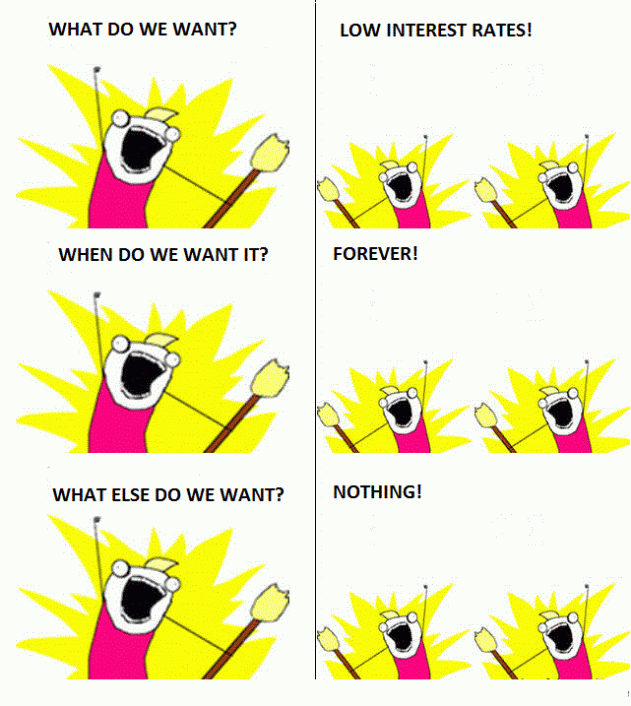The stock market would be telling the Fed something like this:
Sounds crazy, but that’s how present discounted value works. (And thanks to my daughter for the meme.)
This week the Dow fell 3% this after Fed Chair Ben Bernanke’s announcement that eventually the economy would get better and then the Fed would gradually take its foot off the accelerator. That is, the Fed would taper off its quantitative easing (QE; emergency mass purchases of long-term bonds) when unemployment (now 7.6%) fell to 7.0% and then, as announced before, would start raising short-term interest rates back toward normal levels when unemployment fell to 6.5%. He didn’t say this was going to happen soon, and reiterated that the (near-) zero interest rate policy would continue until unemployment falls to 6.5%. Granted, he sounded mildly optimistic that the economy would recovery sooner than expected, but he presented no new data on that score, so it’s an easy prediction to shrug off. Not that the markets did.
The present-discounted-value approach to stock pricing says that a stock is worth its company’s expected future profits in all years to come, divided by a discount factor that is based on the long-term interest rate. The lower the interest rate, the higher the stock’s price should be. The odd thing here is that if the economy picks up, corporate profits should too, which should offset the higher interest rates that Bernanke is hinting at. It may be that corporate profits are already high and are not always easy to predict, whereas long-term interest rates are known now. The 10-year Treasury bond rate rose from 2.2% to 2.5% after Bernanke’s announcement, a 14% increase that is right about in line with the 15% drop in stock prices. (The 10-year Treasury yield is still at a near-historic low, by the way.)
The financial media tend to report any significant-looking drop in stock prices as an economic calamity, overlooking the most basic facts about the stock market, namely that it is volatile and its short-term swings have very little macroeconomic impact. The less we worry about short-term market reaction to the Fed, the better off we’ll be. Jared Bernstein has an excellent piece on the Fed’s announcement, to which I don’t have much to add, only to say that I don’t see much new in the announcement, other than some optimistic predictions and an exit strategy for QE (which had to end sometime).

